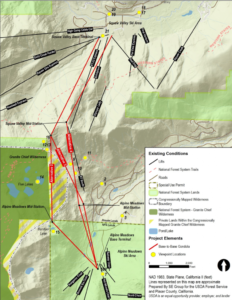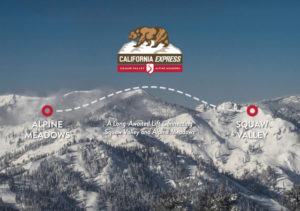As of February 5, 2020 a deal has been reached between Squaw Valley Alpine Meadows and Granite Chief Wilderness Protection League.
The Granite Chief Wilderness League agreed to drop the lawsuit filed against Squaw Alpine’s base-to-base gondola in exchange for the conservation of potential habitat for the Sierra Nevada Yellow Legged Frog as well as funding for its monitoring and research, funding for additional lands in the Granite Chief Wilderness area, and restrictions on gondola operations and use.
The agreement includes:
- The League agreed to dismiss its lawsuit against the Squaw Alpine Base-to-Base Gondola.
- Squaw Alpine agreed to conserve approximately 27 acres of the resort’s private property which include pristine wetlands and deep natural ponds which have the potential to serve as habitat for the endangered Sierra Nevada Yellow Legged Frog.
- Squaw Alpine agreed to provide funding for the study and potential restoration of the Sierra Nevada Yellow Legged Frog (a federally listed endangered species)
- Squaw Alpine agreed to provide separate funding, to be held in trust by the Truckee Donner Land Trust, for the acquisition of private holdings within the Granite Chief Wilderness Area and high resource value lands and/or conservation easements. Land eligible for purchase with the funds include the area within and adjacent to the Granite Chief Wilderness.
- Squaw Alpine also agreed to operational limits for the gondola designed to mitigate potential noise, visual, and other impacts to the nearby Granite Chief Wilderness. This includes signage and strict enforcement of the ski area boundary at the KT-22 mid-station, and an annual gondola closing date of no later than April 30. The gondola will operate during the winter season only, when both Squaw Valley and Alpine Meadows are in operation, or will stop operations by April 30th.
History of the Debate
Placer County supervisors approved the controversial base-to-base gondola between the Squaw Valley and Alpine Meadows ski resorts in July of 2019.
The project received preliminary approval from the Tahoe National Forest earlier that year, but must be formally approved for the project to move forward.
A lawsuit was filed in September, 2019 against Placer County’s approval of Squaw Valley Alpine Meadows base-to-base gondola by the Granite Chief Wilderness Protection League citing the project as having the potential to permanently alter a pristine Sierra Nevada environment and endanger wildlife and destroy the natural habitat.
The suit claimed that the project had not undergone adequate environmental review or mitigation in the Environmental Impact Report certified by the county. The League’s lawsuit against Placer County also named the United States Forest Service. The lawsuit was filed under the California Environmental Quality Act (CEQA) and challenged the adequacy of the environmental analysis and the County Board of Supervisor’s decision to approve the project.
February 5, 2020. The lawsuit was dropped. League Director Daniel Heagerty stated:
“As a high value Sierra wilderness area, the Granite Chief Wilderness needs ever more safeguards to ensure we leave such wild treasures for future generations. Squaw Alpine has made significant and greatly appreciated commitments to minimize wilderness impacts and invest in important endangered species conservation efforts. We are very pleased with the Agreement we reached with Squaw Alpine.”
The Approved Route
The California Express Gondola, is a proposed eight person lift with an approximate 1,400 person per hour capacity, which would allow skiers and snowboarders access to both resorts without having to take a shuttle or drive between the ski areas.
Alterra Mountain Co., Squaw Valley Alpine Meadows’ parent company, originally proposed building the gondola along the crest of the Sierra Nevada and through land desig nated to be part of the wilderness, but that plan was rejected. An environmental impact report released by Placer County and the U.S. Forest Service outlined four possible options for construction of the project. Placer County and the U.S. Forest Service chose “Alternative 4,” the easternmost route under consideration for the gondola.
nated to be part of the wilderness, but that plan was rejected. An environmental impact report released by Placer County and the U.S. Forest Service outlined four possible options for construction of the project. Placer County and the U.S. Forest Service chose “Alternative 4,” the easternmost route under consideration for the gondola.
The approved route would extend from the base of Red Dog chair at Squaw Valley to the base area of Alpine Meadows. The gondola will have 33 towers spanning 11,700 feet, about 2.2 miles and will take approximately 13 to 16 minutes. The project includes two base terminals and two mid-stations. The approved project has been determined to have less of an environmental effect than alternatives, as it occupies the least amount of land. Approximately 20% of the project will be located on national forest lands.
For more information check out the Squaw Valley/Alpine Meadows Website.
A construction start date has not yet been set.




Leave a Reply